Issue 2 : 1 April 2018
Talofa Lava, Kia Orana, Malo E Leilei, Tena Koutou, Hello ...
... and welcome to the latest issue of “For The Love Of The Game”, the official e-zine of the New Zealand Amateur Sport Association Inc. We hope you enjoy reading the articles below.
If you have any feedback on this issue, ideas for future articles, or would like to contact the Editor, please click here. And, you are invited to forward the e-zine to others you know, who may be interested in reading it.
If you are interested in applying for membership of the Association, please click here.
Spacewise Amateur Sports Hour ...
While the Amateur Sports Hour takes a break over the Easter weekend, you can click here to listen to the most recent edition of the show, broadcast on 23 March 2018.
In this edition of the show, Sandy Antipas talks “coaching conduct”, Adam Julian covers the secondary school “Summer Tournament Week” and Dave Piper talks to Commonwealth Games para-athlete, javelin thrower Holly Robinson.

The Amateur Sports Hour is produced with the generous support of Spacewise New Zealand (www.spacewise.co.nz) and in partnership with Te Reo Irirangi o Te Upoko o Te Ika Trust Incorporated. Tune in to 1161AM (or via the web at www.teupoko.co.nz), every Friday between 12.00pm and 1.00pm.
Viewpoint : “Pay To Play” – Sport In Schools …
One of the biggest obstacles to the growth and well-being of amateur sporting clubs nationally may be the increasing insistence of high-schools to charge students who want to join school teams which play in local sporting competitions. While the cost of participation varies by sporting code, it’s not uncommon for families to be asked to stump up over $100 per child, before the costs of clothing and equipment.

(Is the cost of participation having an effect on teenagers joining high school sports teams?)
With social acceptance critical to teenagers, the embarrassment of not being able to pay what are generally hefty (and increasing) subscriptions fees to participate, will be a cause of concern for sporting administrators in amateur clubs throughout New Zealand. The financial stress on families who have more than one teenage child involved in sport can create an unbearable family burden.
In a study undertaken by the University of Michigan, 19% of families that earned less than $60,000 per year reported the cost of sports led to at least one of their children not participating. Among households earning more than $60,000 per year, just 5% of parents said cost had a negative impact on their child’s participation. In summary, nearly 1 in 5 low-income parents reported that cost forced their child to cut back on sports.
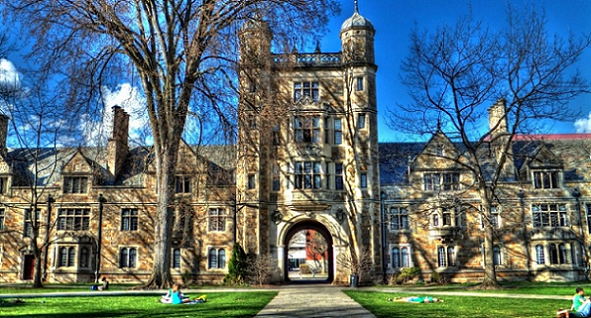
(The University of Michigan has undertaken research on the effect of pay-to-play policies)
While the Government has outlined its plans to replace voluntary school donations with a $150 payment per student, consideration should also be given to a universal student sport subsidy which enables all students to be part of a high-school team. This will not only provide benefits to physical well-bring, but also social and community benefits which teenagers can carry into their adult sporting lives, should they choose to become a member of an amateur sports club.
Association Provides Submission To Secondary School Rugby Review …
The Association was the only non-aligned (non-rugby) organisation to provide feedback to the draft Terms of Reference for New Zealand Rugby’s Secondary School Rugby Review. The Review is intended to provide recommendations on a proposed course of action for New Zealand Rugby to build a sustainable, robust and successful model for secondary school rugby for boys and girls across New Zealand.
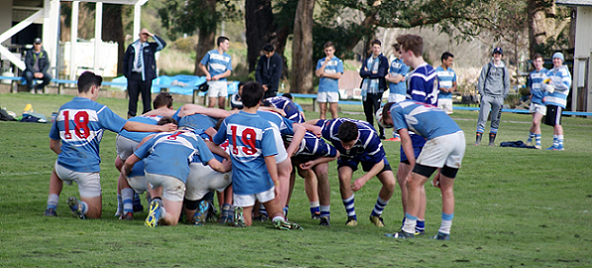
(New Zealand Rugby aims to address challenges in falling high school participation)
The Association’s recommendation (which has been accepted in the final Terms of Reference) is for the appointment of an independent member of the Review Panel. The Association has offered to fulfil this role, however whether or not this occurs is still to be determined by New Zealand Rugby.
Golden-Oldies Sports Celebration In Christchurch ...
Christchurch will host the biennial Golden Oldies Sports Tournament for the second time in the event's history, later this month. In 1979, the first international ‘Golden Oldies’ rugby festival was held in Auckland. Tom Johnson, a former Hawke’s Bay captain and coach, was instrumental in setting it up. Thirteen teams from New Zealand took part, along with two teams made up of players from Canada and the US. The only prerequisite for players was that they had to be over 35. The festival grew rapidly. In 1981 it was held in California, with 46 teams from 11 nations. The 1983 festival in Sydney had 118 teams.
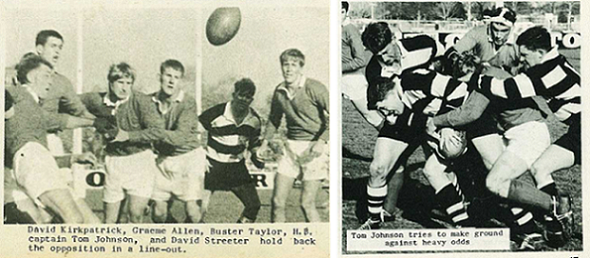
(Dr Tom Johnson PhD, MNZM, played 84 games for Hawkes Bay in the '50's and '60s)
The Golden Oldies concept subsequently spread to other sports. In 1983, hockey and soccer tournaments began, with cricket and netball following in 1984. The first Golden Oldies International Cricket Festival, held in Auckland in 1994, attracted 34 teams from six countries.
The main emphasis in Golden Oldies’ tournaments is on the social side of sport rather than competing to win. This year's Christchurch Tournament features six sports – hockey, netball, rugby, cricket, lawn bowls and golf – and is expected to attract around 5,000 players and supporters to Canterbury.
Japan Association Focuses On “Sport” Rather Than “Sports” …
The Japan Sports Association is modifying its organisational name. In English, the change is tiny. It will now be called the Japan Sport Association, with “Sport” as a singular noun. But taking one letter out indicates what the body wants to do moving forward.
“Sports, in plural, mean an aggregation of different sports,” JSPO chairman Masatoshi Ito said at a news conference on Thursday last week. “But when you make it as sport in singular, it means a common culture of humanity.” The Japanese name (Nihon Taiiku Kyokai) has been unchanged since 1948, but the organisation decided to rename it because sports are no longer a means to just train people as part of education, but are meant to give a more affluent culture to citizens.
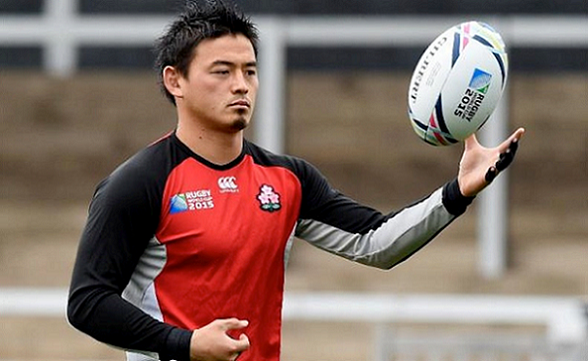
(Goromaru, the highest paid rugby player in the world, advocates for amateur participation)
Rugby star Ayumu Goromaru spoke about his hopes for Japan’s sports culture in the future. “I think that there’s a lot of people that have the top athletes in their mind when they talk about sports,” said Goromaru, who became a household name as a full-back for the Japan national team during the 2015 Rugby World Cup in England. “But sport should be enjoyed by men and women of all ages more widely. So hopefully, communities will expand through sport.”
(Article reproduced from The Japan Times – you can read the full article, here.)
Secretariat Position Available …
One year following its formation in 2017, the Association now requires the service of an experienced Administrator/Secretary, to work with the Board and Members in implementing the strategies of the Association in the areas of amateur advocacy, thought leadership and community engagement.

The position (which will receive an honorarium) requires a person with excellent communication skills, combined with demonstrated proficiency in Microsoft Word and Excel packages, with knowledge of basic accounting. To express interest (and receive further details as to the role requirements) please e-Mail the Association at the following address: office@asa.org.nz.
An Irish Opinion …
Sport, be it amateur or professional is becoming more and more streamed towards the elite.
The Irish Rugby Football Union are mainly interested in their national team, mildly interested in their provinces and have little or no interest in their All-Ireland sides. The Football Association of Ireland (FAI) is going along similar lines. Do these organisations not realise that the more elite you make the top-tier, the more disenfranchised the masses become with the sport as a whole.
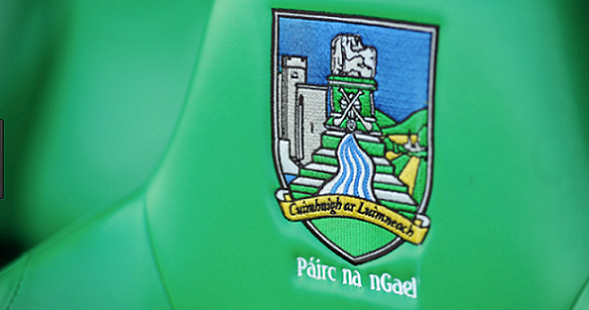
Ireland may be winning Grand Slams, but less and less people are playing and attending the games at grass-roots level. The Premier League in England were, for the first time ever, unable to sell all of their TV packages. The masses who once worshipped at its altar have decided they have had enough of annual jersey changes, rising ticket prices and over-priced subscription packages. Rugby is heading that way with the elitism of schools rugby and the lack of investment in clubs. The Gaelic Athletic Association (GAA), is walking a tight rope with its members and long-time supporters.
Everyone is equal, so they say, unless you can make them more money of course.
(Article reproduced from the Limerick Leader – you can read the full article, here)
Editor's Note: Ireland's Gaelic Athletic Association was formed in 1884 "for the preservation and cultivation of national pastimes". There are six different games in the family of Gaelic Games: Hurling, Gaelic Football, Handball, Rounders, Camogie and Ladies Football. Earlier this year, new GAA President John Horan, asked "What does the amateur status mean to us as GAA members? If it is something that we hold dear then it demands actions not words and leadership at club and county level to make it a core value in how we conduct ourselves. It’s clubs and counties who have the power to control the amateur status and set a standard that illustrates its importance to the association."

From The Archives …
The Easter Tournament, which lasted for 114 years, was replaced by a new year-long inter-university sporting competition in 2016. In this edition of "From The Archives", we travel back to the origins of inter-university competition in New Zealand.
THE UNIVERSITY TOURNAMENT
PRESS, VOLUME LXX, ISSUE 21127, 31 MARCH 1934
The annual Easter tournament of the four colleges of the University of New Zealand, which is being held in Christchurch this year, has been conducted for 32 years.
The idea of such a tournament was in the air for many years before 1902, but practical endeavours began in 1900, when Mr H. P. Richmond, of Victoria University College, and Mr W. L. Scott, of Canterbury College, with Mr C. East, tried unsuccessfully to get the colleges to co-operate. In 1901 Messrs Richmond, G. F. Dixon, and F. A. dc la Marc managed to interest Victoria University College in the proposal, while in Canterbury Mr Arthur Sims and Mr M. Kissel were active workers. Invitations for a tournament to be held in 1902 were sent out: on April 9, 1901. All four colleges were represented in the first tournament, Mr F. C. Long being the chief organiser in Auckland, and Dr. P. H. Buck in Otago.
In this first tournament Canterbury won both the athletic shield and the tennis cup, Otago winning the debating contest. In later years other sports were added to the tournament fixtures - shooting in 1909, boxing in 1920, basketball in 1927, and swimming and rowing eights in 1930.
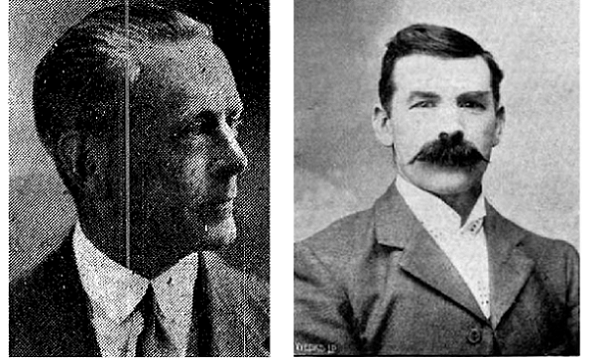
(H P Richmond and W L Scott, Founders of the University Easter Tournament)
The Final Word ...
"Sport is a valuable learning ground for how to live your life in the best possible way."
(Lynn Davies, CBE, 1964 Summer Olympian)